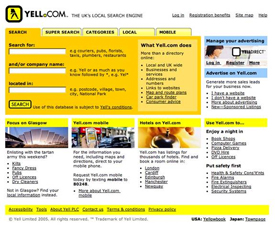 KEY STAGE THREE
KEY STAGE THREE  Year 7
Year 7 Database Theory
Database Theory
2. Computerised Databases
There are many examples of computerised databases, some of which you will have used at home or school.
In order to find the right web sites for you,. Search engines need a vast computerised database which they search using your entered keywords |
 |
|
Many schools now use electronic registers. These contain a database with records for every student in the school. The database records student's attendance both at school and in lessons. |
|
If you don't want to use the paper-based version, a telephone number can be found using an online database such as yell.co.uk. Type in the category you are looking for e.g. builder, type in the area e.g. Warwick and a search will be performed on all the records in the database before giving you a list of results which match your requirements a second or so later. |
 |
|
Details of every person in the United Kingdom over the age of 18 are kept on local electoral registers (also called the 'electoral roll'). This database records your name, address, date of birth and national insurance number. When an election is imminent, cards are printed for every person who is eligible to vote. The cards are then sent to their home address. The card must be brought along to the polling station in order to vote (once). |
|
|
A library stores details of all their books, in a database. When you want to know if a book is in stock, you can not only look it up, but you can also check when it is due to be returned. The database also records details of all the borrowers, what books they currently have borrowed and when they are due back. |
|
Challenge see if you can find out one extra fact on this topic that we haven't already told you
Click on this link: Database Examples
Copyright © www.teach-ict.com



